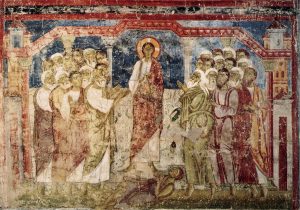Thoughts on Sunday’s Lessons for Jan. 31, 2021
First Reading: Deuteronomy 18:15-20
Hearing God’s voice. Listening for God’s call. This theme echoes in many of our readings through the season of Epiphany, as each week’s Gospel shines more light on the reality of Jesus as Messiah.

Christ heals a man possessed in the synagogue of Capernaum. Eleventh century Romanesque fresco in the former bell house of Lambach Abbey, a Benedictine monastery in Austria. (Click image to enlarge.)
Our first reading brings us to Deuteronomy, the fifth and final book of the Torah, the story of God’s covenant with Israel. The people have reached the promised land, and the long narrative of their travels is drawing to a close. Moses is dying, and now the people worry how they will know God’s wishes once their prophet is gone. Moses reassures them that God will raise up another prophet from among them, and that God will expect them to pay attention when this prophet utters God’s words.
Psalm: Psalm 111
The Psalms – the Hebrew Bible’s book of hymns and worship poetry of the ancient Temple in Jerusalem – take many forms. Some ask God’s favor. Others weep in lament. Some offer thanks for past blessings. And some of the most joyous, such as today’s familiar verses, exultantly sing God’s praise. All of God’s work, all of God’s majesty and splendor, all of God’s justice last forever, the Psalmist exults. God feeds us. God’s covenant redeems us, and the people shout “Hallelujah!” “Praise God!”
Second Reading: 1 Corinthians 8:1-13
These passage might not seem to say much to us in modern times, but it offers us a fascinating insight into understanding Paul as a pastor working with his flock. A question had arisen about whether it was acceptable to eat meat that had been sacrificed in pagan temples. This was a common practice in pagan Greece, where meat from animals who had been sacrificed in the temples were made available to the public. Paul accepts the notion of Corinth’s Jewish Christians that pagan gods aren’t really God at all, so sharing temple food could be morally neutral to Christian believers who are strong in their faith. But the rest of Paul’s conclusion transcends time: Even if we do nothing wrong, our actions may influence others who are not so strong – in this case of the Corinthians, for example, recent converts from paganism. “If food is a cause of their falling,” says Paul, “I will never eat meat, so that I may not cause one of them to fall.”
Gospel: Mark 1:21-28
We are still in the first chapter of Mark’s Gospel, and the ministry of Jesus is getting under way. Jesus, who now has a group of followers, goes to Sabbath services in Capernaum, a small town near the Sea of Galilee where we often find him in Mark’s Gospel. Two remarkable things happen there: First, this young rabbi amazes the congregation with profound teaching that reveals him as one “having authority,” in contrast with the less authoritative scribes. Then Jesus further astounds the people by commanding a noisy unclean spirit to come out of a troubled man. Unclean though the spirit may be, it shouts wisdom, declaring Jesus “the Holy One of God.”
